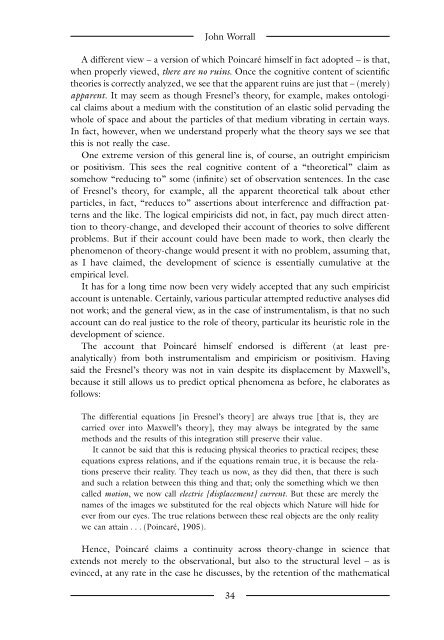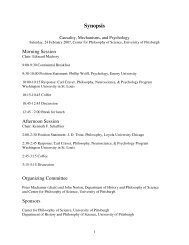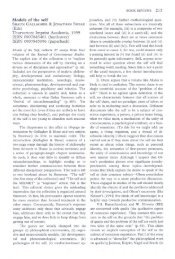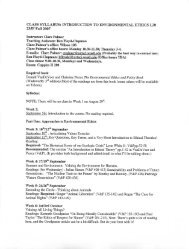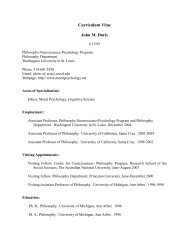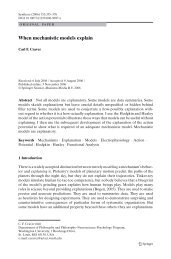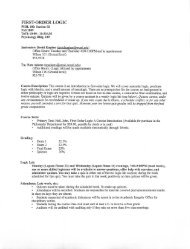The Blackwell Guide to the Philosophy of Science - The Department ...
The Blackwell Guide to the Philosophy of Science - The Department ...
The Blackwell Guide to the Philosophy of Science - The Department ...
Create successful ePaper yourself
Turn your PDF publications into a flip-book with our unique Google optimized e-Paper software.
John Worrall<br />
A different view – a version <strong>of</strong> which Poincaré himself in fact adopted – is that,<br />
when properly viewed, <strong>the</strong>re are no ruins. Once <strong>the</strong> cognitive content <strong>of</strong> scientific<br />
<strong>the</strong>ories is correctly analyzed, we see that <strong>the</strong> apparent ruins are just that – (merely)<br />
apparent. It may seem as though Fresnel’s <strong>the</strong>ory, for example, makes on<strong>to</strong>logical<br />
claims about a medium with <strong>the</strong> constitution <strong>of</strong> an elastic solid pervading <strong>the</strong><br />
whole <strong>of</strong> space and about <strong>the</strong> particles <strong>of</strong> that medium vibrating in certain ways.<br />
In fact, however, when we understand properly what <strong>the</strong> <strong>the</strong>ory says we see that<br />
this is not really <strong>the</strong> case.<br />
One extreme version <strong>of</strong> this general line is, <strong>of</strong> course, an outright empiricism<br />
or positivism. This sees <strong>the</strong> real cognitive content <strong>of</strong> a “<strong>the</strong>oretical” claim as<br />
somehow “reducing <strong>to</strong>” some (infinite) set <strong>of</strong> observation sentences. In <strong>the</strong> case<br />
<strong>of</strong> Fresnel’s <strong>the</strong>ory, for example, all <strong>the</strong> apparent <strong>the</strong>oretical talk about e<strong>the</strong>r<br />
particles, in fact, “reduces <strong>to</strong>” assertions about interference and diffraction patterns<br />
and <strong>the</strong> like. <strong>The</strong> logical empiricists did not, in fact, pay much direct attention<br />
<strong>to</strong> <strong>the</strong>ory-change, and developed <strong>the</strong>ir account <strong>of</strong> <strong>the</strong>ories <strong>to</strong> solve different<br />
problems. But if <strong>the</strong>ir account could have been made <strong>to</strong> work, <strong>the</strong>n clearly <strong>the</strong><br />
phenomenon <strong>of</strong> <strong>the</strong>ory-change would present it with no problem, assuming that,<br />
as I have claimed, <strong>the</strong> development <strong>of</strong> science is essentially cumulative at <strong>the</strong><br />
empirical level.<br />
It has for a long time now been very widely accepted that any such empiricist<br />
account is untenable. Certainly, various particular attempted reductive analyses did<br />
not work; and <strong>the</strong> general view, as in <strong>the</strong> case <strong>of</strong> instrumentalism, is that no such<br />
account can do real justice <strong>to</strong> <strong>the</strong> role <strong>of</strong> <strong>the</strong>ory, particular its heuristic role in <strong>the</strong><br />
development <strong>of</strong> science.<br />
<strong>The</strong> account that Poincaré himself endorsed is different (at least preanalytically)<br />
from both instrumentalism and empiricism or positivism. Having<br />
said <strong>the</strong> Fresnel’s <strong>the</strong>ory was not in vain despite its displacement by Maxwell’s,<br />
because it still allows us <strong>to</strong> predict optical phenomena as before, he elaborates as<br />
follows:<br />
<strong>The</strong> differential equations [in Fresnel’s <strong>the</strong>ory] are always true [that is, <strong>the</strong>y are<br />
carried over in<strong>to</strong> Maxwell’s <strong>the</strong>ory], <strong>the</strong>y may always be integrated by <strong>the</strong> same<br />
methods and <strong>the</strong> results <strong>of</strong> this integration still preserve <strong>the</strong>ir value.<br />
It cannot be said that this is reducing physical <strong>the</strong>ories <strong>to</strong> practical recipes; <strong>the</strong>se<br />
equations express relations, and if <strong>the</strong> equations remain true, it is because <strong>the</strong> relations<br />
preserve <strong>the</strong>ir reality. <strong>The</strong>y teach us now, as <strong>the</strong>y did <strong>the</strong>n, that <strong>the</strong>re is such<br />
and such a relation between this thing and that; only <strong>the</strong> something which we <strong>the</strong>n<br />
called motion, we now call electric [displacement] current. But <strong>the</strong>se are merely <strong>the</strong><br />
names <strong>of</strong> <strong>the</strong> images we substituted for <strong>the</strong> real objects which Nature will hide for<br />
ever from our eyes. <strong>The</strong> true relations between <strong>the</strong>se real objects are <strong>the</strong> only reality<br />
we can attain . . . (Poincaré, 1905).<br />
Hence, Poincaré claims a continuity across <strong>the</strong>ory-change in science that<br />
extends not merely <strong>to</strong> <strong>the</strong> observational, but also <strong>to</strong> <strong>the</strong> structural level – as is<br />
evinced, at any rate in <strong>the</strong> case he discusses, by <strong>the</strong> retention <strong>of</strong> <strong>the</strong> ma<strong>the</strong>matical<br />
34


